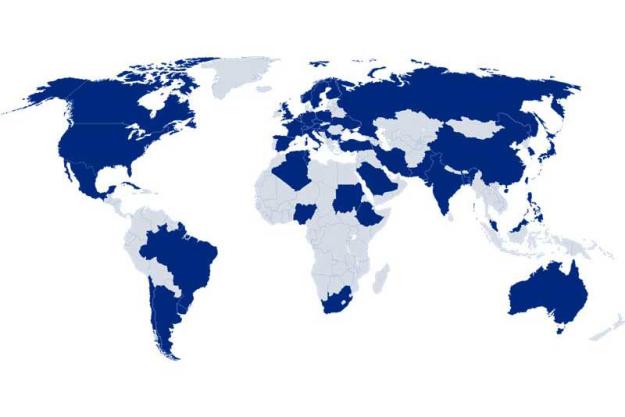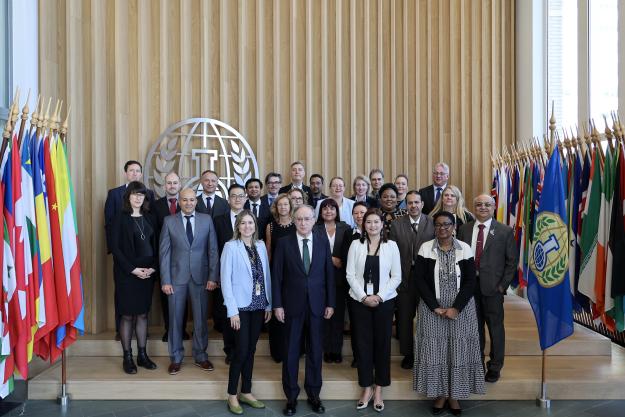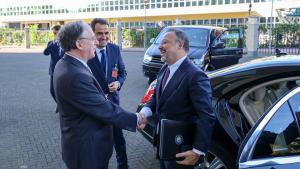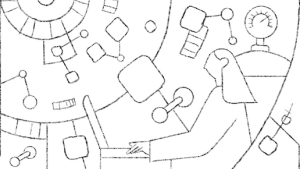The Scientific Advisory Board (SAB) is an OPCW subsidiary body that enables the Director-General to render specialised advice in science and technology to the Conference, Executive Council, or States Parties to the Convention.
The SAB reports to the Director-General, who submits its reports, alongside his own response, to the Executive Council. Every five years, the SAB prepares a larger report on developments in science and technology for submission to Review Conferences of the Chemical Weapons Convention.
The role of the SAB is to assess and report to the Director-General developments in scientific and technological fields that are relevant to the Convention. On request, the SAB provides advice on technical matters related to the implementation of the Convention, including on co-operation and assistance to the Technical Secretariat.

Map of the world showing SAB membership from 1998 to 2025 in dark blue
A Group of Independent Experts
The SAB is made up of 25 independent experts from OPCW Member States. The members serve in a personal capacity (not as representatives of their respective governments) for up to two consecutive three-year terms. The SAB chair and vice-chair are elected annually.
The SAB can also establish and coordinate temporary working groups to draw upon extended expertise for assessment and reporting on specific issues of relevance to the Convention.

Members of the OPCW Scientific Advisory Board 2025
Members
(as of January 2025)
- Chairperson: Dr Imee Su Martinez
- Vice-chairperson: Professor Elisa S. Orth
Dr Crister Åstot (of Sweden) is currently a research director at the Swedish Defence Research Agency (FOI), Dept of CBRN Defence and Security, Umeå, Sweden. He is an expert in chemical analysis of CWAs and is the current manager of the OPCW Designated Laboratory at FOI. His research includes development of methods for chemical attribution profiling (forensic analysis) and analysis of chlorine biomarkers in biomedical samples. He has authored and co-authored many peer-reviewed publications and has a position as an assistant professor at the University of Linköping, Sweden.
Dr Tareq ALAhmadi (of Saudi Arabia) is currently a faculty member of the Department of Criminal Evidence at the King Fahd Security College. His areas of expertise include forensic science such as toxin analysis, sampling, detection, and identification, and his current research interests include drugs of abuse, pesticides, and toxic gases. He has taken part in many forensic science-related cases over his twenty-eight years of experience. Dr. ALAhmadi provides lectures for raising awareness regarding toxicology and supports various training, projects, and exercises. He has authored and co-authored numerous peer-reviewed publications, as well as numerous articles and book chapters, and has supervised many graduate and undergraduate students. Over his career he has functioned as a consultant to Civil Defense and the National Committee for Combating Drugs on matters involving gas toxic and fires and drugs of abuse and maintains collaborations with many sectors of the Ministry of Interior.
Professor Allisson Astuya Villalón (of Chile) is an Associate Professor in the Department of Oceanography at the Faculty of Natural and Oceanographic Sciences at the University of Concepción, and a researcher at the COPAS COASTAL Oceanographic Research Center. Dr Astuya also serves as the Director of the Biotoxin Laboratory at the University of Concepción (LBTx-UdeC), the first laboratory accredited under the ISO17025 standard for toxin detection in the Biobío region of Chile. Her research explores the function, molecular and pharmacological targets, mechanisms of action, and the design of detection tools for marine toxins and ichthyotoxins, as well as potential biomedical and veterinary applications, such as the development of an anesthetic based on microalgae from harmful algal blooms for use in aquaculture to improve animal management. Since 2014, she has been an Expert for the “Marine Toxins” Study Group of the Chilean Association for Food Safety (ACHIPIA). She has published numerous papers in specialized journals and holds 5 granted patents. Dr. Astuya holds a degree in Biochemistry and a Ph.D. in Biological Sciences, specializing in Cellular and Molecular Biology.
Dr Karim Ben Ali (of Tunisia) is currently the director of the technological watch and foresight department in the Tunisian Military Research Center (CRM). His area of expertise includes organic chemistry and the analytical chemistry applied to Nuclear Magnetic Resonance spectroscopy (NMR) and Mass Spectrometry techniques, but also has extensive expertise in conducting scientific research in several areas such as ballistics and countering Improvised Explosive Devises (IED) and CBRN threats. He has experience in both local scientific activities as well as in international cooperation to include work on chemical mobile labs and decontamination of CWAs within the NATO-Science for Peace and Security (SPS) programme. Dr BEN ALI currently leads a team of scientists in the “Sciences and Technologies for Defense’ (STD) laboratory in the Tunisian Military Research Center. Dr. BEN ALI obtained his PhD in Organic Chemistry in 2004 from the University of Paris XI, at the “Institut de Chimie des Substances Naturelles” of the French National Centre for Scientific Research (CNRS) campus.
Captain Elma Lilia Biscotti (of Argentina) is the Chief of International Agreements at the Scientific and Technical Research Institute for Defense, and an expert advisor of the Ministry of Foreign Affairs and of the Ministry of Defense on chemical and biological weapons issues. She holds a degree in biochemistry and in pharmacy, and also is a specialist in evaluation of the environmental contamination and its toxicological risk. Captain Biscotti is member of the Argentine National Authority for the Chemical Weapons Convention and member of the National Commission for the Control of Sensitive Exports and Military Materiel. Her areas of expertise are implementation of the CWC, chemical and biological weapons non-proliferation measures, and convergence of chemical and biological sciences.
Dr Anne Bossée (of France) is in charge of the synthesis, toxicology and analytical chemistry branch in DGA CBRN Defense, the French military center for CBRN concern. She also manages the French OPCW designated laboratory. She holds an analytical chemistry PhD degree from the University of Pierre and Marie Curie in Paris, France. Her areas of expertise include toxin analysis, sampling, detection and identification of CWA and related compounds in environmental and biomedical matrices. She is a former member of SAB temporary working groups on sampling and analysis and Proficiency Tests Scheme. She is co-author of the editing group for Verifin “Recommended Operating Procedures for analysis in the verification of chemical disarmament”.
Dr Cindi Corbett (of Canada) is the Director of the Health Security and Response Division at the Public Health Agency of Canada’s National Microbiology Laboratory (NML). The Health Security and Response Division is Canada’s foci for high-consequence infectious disease laboratory response. The division focuses on esoteric diagnostic testing for rare microorganisms, high-consequence pathogen detection, surveillance, cutting edge pre-clinical MCM research and leadership within national and international laboratory networks. Cindi is one of Canada’s experts on security sensitive biological agents, providing guidance to the Royal Canadian Mounted Police led Chemical, Biological, Radiological, Nuclear and Explosives (CBRNE) National Response Team for biological security responses. Furthermore, Dr. Corbett’s research focuses on the advancement of capabilities for biological agent detection, identification and characterization, including novel detection assays for biological toxins. Over the past decade, Dr. Corbett has established and continues to foster the ongoing advancement of microbial forensic laboratory capabilities, ensuring that microbiological investigations meet standards required to withstand legal scrutiny, and that Canada remains vigilant in its preparedness against potential biothreats.
Mr. Raza Ellahi (of Pakistan) is a chemist with over 30 years of experience. At present, he is leading the Chemical Research Centre (CRC) at the Defence Science & Technology Organization (DESTO), Pakistan. He is a recognized expert with the National Authority for implementation of the CWC at a national level. His core area of research is chemical protective sciences to include forensic toxicology, identification of CWAs in environmental & biomedical matrices, and green synthesis of advanced functional materials. He also specializes in development & integration of detection systems. His operational expertise includes field response management including decontamination, threat assessment, and incident response to CWAs. At present he is leading a team of scientists and engineers engaged in the development of nanomaterial-based detection systems for protective measures against toxic effects of CWA’s.
Dr Norman Govan (of the United Kingdom of Great Britain and Northern Ireland) is Principal Advisor for Hazard Management at the Defence Science and Technology Laboratory (Dstl, Porton Down). He obtained his PhD in Chemistry from the University of St Andrews (Scotland) and is a Dstl Research Fellow. He has extensive expertise in conducting research at the interface of scientific disciplines (Chemistry, Biology, Engineering and Mathematics) to develop novel CBR Hazard Mitigation approaches. During the recent nerve-agent incident in Salisbury, he was the lead scientist responsible for planning and executing Recovery operations.
Dr Matteo Guidotti (of Italy) works as Senior Researcher at the Institute of Chemical Sciences and Technology Institute “Giulio Natta” (SCITEC) of the Italian National Research Council (CNR) in Milan. His research interests include the design, preparation and testing of solid catalysts for the transformation of high added-value chemicals and nanostructured catalysts for the degradation of hazardous chemical and biological materials. He is involved in awareness-raising, dissemination and training activities on chemical aspects related to the protection, prevention, mitigation and defence against chemical, biological and radiological warfare agents. He serves as Key Expert for the EU CBRN Risk Mitigation Centre of Excellence in South-East and Central Asia, Italian delegate in the Division on Chemistry and Environment of the International Union of Pure and Applied Chemistry (IUPAC) and Qualified Expert and Trainer for CBRN Defence in Auxiliary Corps of the Italian Army. He is member of the Academy of Sciences of the Institute of Bologna, the Academy of Sciences of Siena and the Gioenia Academy of Catania.
Professor Bartosz A. Grzybowski (of Poland) is a Distinguished Professor of Chemistry at the Ulsan National Institute of Science and Technology (UNIST, South Korea) and a Director of the IBS Center for Algorithmic and Robotized Synthesis (CARS) located therein. He is also Professor at the Institute of Organic Chemistry, Polish Academy of Sciences. Although he has spent a large fraction of his research career on esoteric problems of self-assembly and non-equilibrium systems, he considers his most impactful discoveries to be in the area of computer-driven synthesis (e.g., the Chematica/Synthia and Allchemy programs). The chemical AI algorithms and robotics systems Grzybowski develops find applications in both academic and industrial settings and have ramifications for the issues of global chemical production, circular economy, and national security. Grzybowski is an author of ca. 300 articles (H = 87) and has over the years received numerous accolades of which the 2016 Feynman Prize and the 2022 Foundation for Polish Science Prize are closest to his heart. He has started several companies and has advises various industrial and governmental bodies in areas ranging from AI to oil drilling.
Dr Catharina Müller-Buschbaum (of Germany) is currently Managing Director at Accenture and the Innovation Lead for Accenture Industry X Service in Europe. Her focus is on digitalisation of engineering and manufacturing across all industry sectors. She gained profound experience in the chemical industry with the global specialty chemicals company Evonik and holds a doctorate in chemistry from the University of Cologne, Germany.
Professor Keunhong Jeong (of the Republic of Korea) is a full professor in the Department of Chemistry at the Korea Military Academy. His research interests include quantum hyperpolarization, quantum chemical calculation, artificial intelligence, and chemical safety, with focus on applying AI and quantum technology to predict the toxicity and chemical properties of hazardous substances. He conducts research across multiple disciplines, working on quantum hyperpolarization and the prediction of spectroscopy spectra for hazardous materials using AI and quantum chemistry. Professor Jeong has published over 100 papers and serves as an expert advisor to various national and international organizations. In particular, he serves as a strategic advisor for national quantum technology initiatives, where he provides specialized knowledge in quantum technology applications for defense and security. Professor Jeong is also a Lieutenant Colonel in the Korean military.
Dr Viktor Kholstov (of the Russian Federation) is the Head of the Center for Analytical Studies on Conventions on the Prohibition of Chemical and Biological Weapons at the Ministry of Industry and Trade of the Russian Federation, Federal State Unitary Enterprise, “GosNIIOKhT”. He holds a doctorate in chemistry and is an author on more than 250 scientific papers and patents.
Dr Robert Kristovich (of the United States of America) is Chief of the Threat Agent Sciences Division at the United States Army DEVCOM Chemical Biological Center. His expertise is in the chemistry and toxicology of chemical warfare agents and other chemicals of military concern. Included in this experience is the development of inhalational toxicity models utilized for human risk assessment of exposure. During his more than fifteen years of experience, he has functioned as a consultant to various national and international groups on matters involving the defense against use of chemical and biological weapons.
Dr Imee Su Martinez (of the Philippines) is a faculty member of the Institute of Chemistry, University of the Philippines-Diliman (UPD), under the Physical Chemistry Division. She repatriated to the Philippines in 2012 as a recipient of the Philippine Department of Science and Technology (DOST) Balik Scientist (Returning Scientist) Program, and the University of the Philippines-System Balik PhD (Returning PhD) Program. At present, Dr Martinez is also serving UPD as the Director for the Office of International Linkages (OIL Diliman). Her research interest is on surface chemistry, particularly in the characterization and imaging of interfaces and interfacial phenomena. Her current research projects are focused on ionic liquids for carbon-capture applications, sensor development for food safety, phospholipid interfacial formation, nanotechnology safety, and instrumentation development for probing surfaces.
Professor Elisa S. Orth (of Brazil) is a professor at the Federal University of Paraná and leader of the ‘Catalysis and Kinetics’ research group. Her research is focused on organophosphorus chemistry, neutralization and detection processes of agrochemicals and chemical warfare simulants, forensic science, chemical security, molecular design, disaster mitigation, catalysis, functionalization of nanomaterials and renewable resources and green chemistry. Prof. Orth holds several collaborations worldwide, including the Federal Police of Brazil in the area of disaster mitigation. She is an author on numerous articles, patents, and book chapters and has supervised many post-doctoral, graduate and undergraduate students. Prof. Orth is an affiliate member of the Brazilian Academy of Science and deputy-coordinator of the PhD Chemistry Course in her institution. She is also engaged with gender equality and scientific dissemination activities. She was a former member of the directory board of the Brazilian Chemical Society, where she co-founded a dedicated office related to women in science.
Dr Meehir Palit (of India) is currently the Head of the Biomedical Verification Division and the Instrumentation & Product Design Division at the Defence Research and Development Establishment (DRDE) in the Defence Research and Development Organisation (DRDO) of the Ministry of Defence. In addition, Dr Palit is a technical adviser to the Indian National Authority and other agencies. His area of expertise is in on-site and off-site analysis of chemicals related to the Chemical Weapons Convention in both environmental and biomedical matrices. He also has extensive experience in the synthesis of CWC-scheduled chemicals and is specialised in the development & integration of detectors and detection systems. Previously, Dr Palit was a Senior Analytical Chemist at the OPCW, where he was responsible for coordinating the on-site sampling & analysis, LC-MS support and preparation of proficiency test samples by the OPCW Laboratory. He has authored and co-authored numerous peer-reviewed publications. He received his MS in Analytical Chemistry and PhD in Chemistry from Jiwaji University in India.
Professor Ines Primožič (of Croatia) is a faculty member of the Department of Chemistry in the Faculty of Science at the University of Zagreb. Her areas of interest include design and syntheses of potential antidotes for organophosphorus poisoning and inhibitors of cholinesterases, organic syntheses of heterocyclic bioactive compounds, and molecular modelling studies of enzyme catalysed reactions.
Dr Moussa Sehailia (of Algeria) is a Director of Research and Research Group Team Leader at the Scientific and Technical Research Centre in Physico-chemical Analyses (CRAPC), Algeria. He graduated with a first-class degree and PhD in chemistry from University College London (UCL) in the UK. He commenced his career in the area of synthetic organic chemistry/medicinal chemistry in the Oncology iMed Department at AstraZeneca, Alderley Park, UK and later moved to the UCL School of Pharmacy as a research associate in synthetic chemistry. Dr. Sehailia’s research interests spans many areas of chemistry primarily targeted at therapeutic/medicinal applications, namely carbohydrate chemistry, heterocyclic chemistry, chemical biology and catalysis. At present time, his main research revolves around the synthesis of novel chemical space for the treatment of diabetes mellitus. Dr. Sehailia is a champion for the promotion of safe and secure usage of hazardous chemicals in Algeria and was part of the multidisciplinary experts that helped design the OPCW Indicative Guidelines for Chemical Safety and Security in Small and Medium-sized Enterprises to Foster the Peaceful Uses of Chemistry.
Professor Sermet Sezigen (of Türkiye) currently serves as a senior lecturer at the University of Health Sciences, Department of Medical CBRN Defense in Ankara. He holds a PhD degree in medical CBRN defense and completed a postdoctoral fellowship in Bundeswehr Institute of Pharmacology and Toxicology in Munich, Germany. He is an expert in medical CBRN defense and chemical terrorism, and his research focuses on medical management of sulfur mustard casualties including verification of CWA exposure. In this capacity he has completed several medical missions in the Middle East for the medical management of victims of chemical terrorism. His research interests also include developing electrochemical biosensors for the detection of nerve agent exposure and designing virtual reality training platforms for CBRN incidents. Professor Sezigen has authored and co-authored numerous peer-reviewed articles and book chapters and is the co-editor of the Turkish version of the OPCW “Practical Guide for Medical Management of Chemical Warfare Casualties”. He is a current member of Turkish Society of Toxicology and EUROTOX.
Dr Raja Subramaniam (of Malaysia) earned his PhD in Analytical Chemistry from the Swedish Defence Research Agency (FOI), specializing in simplified methods for analyzing chemical warfare degradation products. Following his doctorate, he joined the Department of Chemistry Malaysia as a government chemist. With nearly 23 years of experience, Dr Raja has extensive expertise in chemical weapon analysis, CBRN detection and response, the Chemical Weapons Convention (CWC), and chemical safety and security. He was instrumental in establishing Malaysia’s Chemical Weapons Analysis Laboratory in 2016 and co-developed the OPCW Advanced Course on Chemical Weapon Response for the Asia Region, first hosted by Malaysia in 2013. In 2017, he played a key role in chemical analyses and expert court testimony for a high-profile chemical weapons incident in Malaysia. Currently serving his second term as Undersecretary of Malaysia’s National Authority for the CWC until 2026, Dr Raja will subsequently return to his role at the Department of Chemistry Malaysia.
Dr Fengxia Sun (of China) is a professor in College of Chemical and Pharmaceutical Engineering, Hebei University of Science and Technology. Her expertise and research interests are involved in chemical engineering, pharmaceutical engineering, and biochemical process. She has more than 20 years practical experience in chemical and pharmaceutical engineering, developing control strategies for manufacturing process implementation and improvement, finding solutions for industrial chemical production, developing green synthesis process for chemicals from laboratory to industrial scales and designing in efficient and safe manufacturing processes. Dr Sun has served as chief scientist, chief technology officer and technical expert in many well-known Chinese pharmaceutical enterprises. She is also a technical adviser to the Chinese National Authority for the Chemical Weapons Convention and has assisted several OPCW Article VI inspections at declared chemical industry facilities in China since 2007.
Professor Vessela Tsakova (of Bulgaria) is a former Director and current member of the Institute of Physical Chemistry at the Bulgarian Academy of Sciences. With a background in physics, she works in the fields of physical chemistry and electrochemistry. Her research area covers the synthesis of electrode materials based on metals, metal oxides and conducting polymers, focusing on improving their electrocatalytic and electroanalytical properties. She is committed to the development of materials tailored for the electrochemical identification of environmental contaminants and chemical compounds inherent to human metabolism. She is the leader of the Bulgarian Distributed Research Infrastructure INFRAMAT, a major national initiative in materials science implemented by a consortium of sixteen prestigious research, educational and cultural institutions.
Dr Nomandla Magnificent Vela (of South Africa) is Chief Scientist at Protechnik Laboratories, where she is responsible for providing technical support to the South African National Defence Force (SANDF) to ensure maintenance and further development of a defensive capability against chemical and biological weapons. Dr Vela also provides technical support to the South African National Authority responsible for the implementation of, and compliance to obligations under the Chemical Weapons Convention. Dr Vela holds a BSc, BSc-Hons (Chemistry) and MSc degree (Organic chemistry), from Nelson Mandela Metropolitan University, and a PhD degree in organic chemistry from the University of KwaZulu-Natal.
Related News
More News- AI and Chemical Safety and Security Management: joint OPCW-China workshop on AI International experts discuss safe, ethical, and peaceful use of AI technologies in chemistry in Shanghai
- OPCW Director-General meets Türkiye’s Deputy Foreign Minister Discussions highlight OPCW’s ongoing efforts to fully eliminate Syria’s chemical weapons programme
- OPCW AI Research Challenge: Harnessing AI tools to enhance global chemical security OPCW teams up with four institutions to leverage AI to strengthen the Organisation’s scientific and technological capabilities



